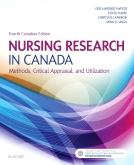Nursing Research Methods and Critical Appraisal for Evidence-Based Practice, 8th Edition by Geri LoBiondo – Test Bank
Chapter 05: Introduction to Qualitative Research
Test Bank
MULTIPLE CHOICE
1. A characteristic of qualitative research data is that they are what?
|
a. |
In text form |
|
b. |
Dichotomous |
|
c. |
Free of patterns |
|
d. |
Inappropriate for analysis |
ANS: A
|
Feedback |
|
|
A |
A distinctive characteristic of qualitative research studies is that data consist of text (words), not numbers as in quantitative research. |
|
B |
Dichotomous data are nominal and frequently found in quantitative studies. |
|
C |
Patterns emerge from qualitative research data. |
|
D |
The data generated by qualitative studies are appropriate for content analysis. |
DIF: Cognitive Level: Remembering (Knowledge) REF: Page 96
2. A nurse researcher who is considering whether to use a qualitative research design should be aware that the focus of qualitative research is what?
|
a. |
Measuring one or more human characteristics |
|
b. |
Controlling variables that interfere with the phenomenon being studied |
|
c. |
Viewing human beings as composites of many body systems |
|
d. |
Studying human experiences that occur within a person’s natural setting |
ANS: D
|
Feedback |
|
|
A |
Measuring variables (one or more human characteristics) is not a focus of qualitative research. |
|
B |
Control of variables is consistent with quantitative research design. |
|
C |
Qualitative studies view human beings in a holistic way, not as the sum of parts. |
|
D |
Human experience occurring in a person’s natural setting is the focus of qualitative studies, although investigators may not always go to the setting where the person experienced the phenomenon. |
DIF: Cognitive Level: Understanding (Comprehension) REF: Page 96
3. The determining factor for a researcher in selecting a qualitative research approach should be what?
|
a. |
The need to test a theory |
|
b. |
The nature of the research question |
|
c. |
The age and gender of the research participants |
|
d. |
The availability of valid instruments to measure the phenomenon |
ANS: B
|
Feedback |
|
|
A |
Qualitative studies are often represented as theory-generating, not theory-testing, studies. |
|
B |
Each research method originates in a philosophy of research and matches the nature of the research question. |
|
C |
These demographic variables may be characteristics of subjects or participants in quantitative or qualitative research studies. |
|
D |
Instruments to measure variables are not used in qualitative research studies. |
DIF: Cognitive Level: Understanding (Comprehension) REF: Page 97
4. Which of these terms is synonymous with paradigm?
|
a. |
Empiricism |
|
b. |
Worldview |
|
c. |
Holism |
|
d. |
Viewpoint |
ANS: B
|
Feedback |
|
|
A |
Empiricism refers to the reliance on observation and experimentation, i.e., quantitative research. |
|
B |
A paradigm is a worldview, a philosophical or theoretical framework. |
|
C |
Holism is a theory that the universe and living nature are correctly seen as interacting wholes, more than the sum of their parts. |
|
D |
A viewpoint is a way of looking at or thinking about a subject. |
DIF: Cognitive Level: Remembering (Knowledge) REF: Page 97
5. In which of these circumstances should a nurse researcher select a qualitative research design instead of a quantitative design?
|
a. |
The time for data collection is limited. |
|
b. |
The research question is clinical in nature. |
|
c. |
The goal is to view the phenomenon in the same way as those who experience it. |
|
d. |
The researcher is a novice with minimal experience in scientific problem solving. |
ANS: C
|
Feedback |
|
|
A |
Some qualitative studies take extended times to complete. |
|
B |
Both qualitative and quantitative research designs may be used to answer research questions that are clinical in nature. |
|
C |
This describes qualitative research designs. The interpretive, naturalistic approach values the lived experience from the perspectives of participants and informants. |
|
D |
Novice researchers are challenged by both qualitative and quantitative research studies. |
DIF: Cognitive Level: Understanding (Comprehension) REF: Page 97
6. Which research topic would most likely be studied through a qualitative research approach?
|
a. |
The meaning of health and health promotion among low-income Southern rural women. |
|
b. |
Changes in hope and coping in older adults during rehabilitation after hip fracture. |
|
c. |
Exercise effects on fatigue and emotional distress during radiation therapy for breast cancer. |
|
d. |
Older adults and HIV/AIDS: The relationship of perceived risk and willingness to interact with individuals with HIV/AIDS. |
ANS: A
|
Feedback |
|
|
A |
Qualitative research focuses on what experiences mean to people. |
|
B |
This topic suggests a descriptive study design. |
|
C |
This topic suggests an experimental study design. |
|
D |
This topic suggests an ex post facto or correlational study design. |
DIF: Cognitive Level: Applying (Application) REF: Page 96














Reviews
There are no reviews yet.